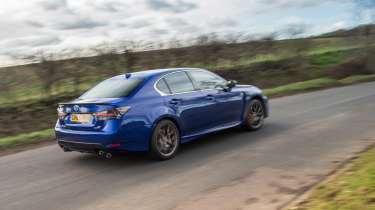Lexus GS F review - brawny V8 saloon tested on UK roads
Lexus's super saloon offers a compelling blend of old-school brawn and new tech
What is it?
We’ve already tried the Lexus GS F briefly, on sun-baked roads near Madrid, but it’s well worth revisiting here in the UK and for an extended period. Mostly because it swims against the tide of vast power and forced induction to create a unique take on the modern supersaloon.
Engine, transmission and 0-60mph time
The GS F’s 5-litre V8 might not match that of other super saloons but isn’t exactly weedy. It produces 471bhp at 7100rpm and 391lb ft from 4800 to 5600rpm. The sole gearbox option is an eight-speed, torque converter automatic, and this 1790kg saloon car gets from 0 to 62mph in 4.6sec and is limited to 168mph.
Technical highlights
Driving modes include Eco, Normal, Sport S and Sport S+, which act on the throttle mapping, steering weight, stability control intervention and, rather controversially, the Active Sound Control, which cancels unwanted noise and enhances all that creamy V8ness through the speaker system. However, you can just turn it off and we’d suggest doing just that.
You can also choose between Standard, Slalom and Track modes for the TVD (Torque Vectoring Differential) and in Sport S+ mode you can select ‘Expert’ mode for the VDIM stability control. Do so and the electronics should only step in to prevent a spin.
What’s it like to drive?
That V8 is central to the GS F driving experience and it’s really rather wonderful. It’s a big, brawny engine with an old-school feel in some respects, but it uses plenty of tech, including direct injection, forged connecting rods and titanium inlet and exhaust valves. Its variable valve timing system also allows it to adopt the more efficient Atkinson cycle in gentle use but still howl around to its 7300rpm limiter when you ask.
More reviews
You’ll find yourself doing just that with surprising frequency, because the GS F offers a highly addictive dynamic experience. Best of all, and despite the many different driving modes and settings for the torque-vectoring differential and traction control, the GS F feels just right. It might take a while to work out exactly how to tune your own perfect set-up, but there’s an intuitive, timeless feel to the whole experience that seems instantly familiar and yet exciting.
The variety of driving modes on offer sounds complicated but, so long as you’re in Sport S or Sport S+ mode, the GS F will feel very good indeed. On the road, the various settings for the diff make only a very subtle difference, with Slalom mode slightly speeding up steering response and Track mode reducing oversteer but retaining a really lovely ability to steer the car on the throttle.
The dampers are fixed-rate and offer an excellent compromise, allowing enough roll and pitch to get a really good feel for the car’s balance but offering enough support to keep the weight well under control. Without a great shock of torque to contend with, the chassis is fluid, easy to read and very progressive. There’s a bit of understeer if you push too hard but, with accurate control of the engine’s delivery, it’s easy to drive through that phase and balance the car on the point of oversteer.
Of course it’s not perfect. The gearbox is massively outclassed by the best dual-clutch systems. Sometimes it’s superb, delivering clean upshifts and rapid response to a downshift request. Then, inexplicably, it’ll refuse to change up when you ask, or throw in a late, fluffy downshift. It’s most odd. The electric steering isn’t particularly feelsome, but it’s quick and fluid so it’s not a great hindrance to enjoying the car and does impart a sense of real agility. The brakes are superb, oversensitive at first but better with experience, and they cope very well during hard road driving.
Price and rivals
The GS F is somehow more than the sum of its parts and much more appealing than the RC F with which it shares much. At £69,995 it’s not going to be a common sight, but you can bet when you see one the driver will be wearing a broad grin.
Cars like the BMW M5 and Mercedes-AMG E63 deliver greater outright performance, but both come at greater cost, as do others touting similar power outputs. Some are better to drive too, but few provide the old-school feeling (and fewer still the quality) of the big Lexus.






